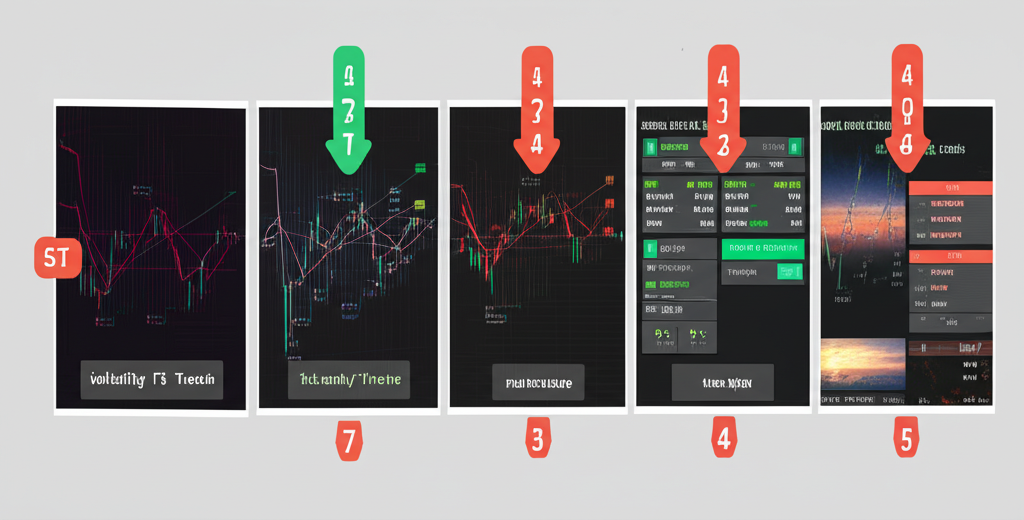How to Trade Volatility 75: Complete Step-by-Step Guide
Master V75 trading with this comprehensive tutorial covering platform setup, strategy selection, risk management, and execution techniques for consistent profits.

What is the Volatility 75 Index?
The Volatility 75 Index (V75) is a synthetic financial instrument that simulates the volatility of an underlying market with a constant 75% annualized volatility. Unlike traditional markets, V75 is not based on real-world assets but is generated using advanced mathematical models.
This synthetic nature provides several unique advantages: 24/7 trading availability, immunity to economic news events, consistent volatility patterns, and tight spreads. These characteristics make V75 an attractive option for traders seeking predictable market behavior.
📚 Recommended Reading
Getting Started: Platform Setup
Before you can start trading V75, you need to set up your trading environment properly. Here's a step-by-step guide:
Choosing a Broker
Select a reputable broker that offers synthetic indices trading. Look for features like competitive spreads, reliable execution, and comprehensive charting tools. We recommend Deriv for their excellent V75 trading conditions.
Platform Configuration
- Download and install your chosen trading platform
- Create a demo account to practice without risk
- Familiarize yourself with the interface and tools
- Set up your charts with appropriate timeframes
Ready to Start Trading V75?
Put these strategies into action with a trusted broker. Join thousands of successful V75 traders today.
Understanding V75 Characteristics
To trade V75 successfully, you must understand its unique characteristics:
Constant Volatility
V75 maintains a consistent 75% annualized volatility, meaning price movements are more predictable than traditional markets. This consistency allows for more reliable strategy development and backtesting.
No External Influences
Unlike forex or stock markets, V75 is not affected by economic news, earnings reports, or geopolitical events. Price movements are purely based on mathematical models, eliminating fundamental analysis requirements.
Continuous Trading
V75 trades 24/7 without market closures, weekends, or holidays. This provides unlimited trading opportunities and eliminates gap risk associated with traditional markets.
Essential Trading Strategies for V75
Here are the most effective strategies for trading the Volatility 75 Index:
Trend Following Strategy
Identify the prevailing trend using moving averages or trend lines, then enter trades in the direction of the trend. This strategy works well on V75 due to its tendency to form clear directional moves.
Mean Reversion Strategy
Look for extreme price movements away from the average, then trade the expected return to the mean. Use Bollinger Bands or RSI to identify overbought/oversold conditions.
Breakout Strategy
Trade the breakout from consolidation patterns like triangles, rectangles, or flags. V75's volatility often leads to explosive moves after periods of consolidation.
📚 Recommended Reading
Ready to Start Trading V75?
Put these strategies into action with a trusted broker. Join thousands of successful V75 traders today.
Risk Management Essentials
Proper risk management is crucial for long-term success in V75 trading:
Position Sizing
Never risk more than 1-2% of your account balance on a single trade. Calculate your position size based on your stop loss distance and risk tolerance.
Stop Loss Placement
Always use stop losses to limit potential losses. Place them at logical levels like support/resistance zones or beyond recent swing highs/lows.
Take Profit Targets
Set realistic profit targets based on technical analysis. Consider using a risk-reward ratio of at least 1:2 to ensure profitable trading over time.
Technical Analysis for V75
These technical analysis tools are particularly effective for V75 trading:
Moving Averages
Use the 20, 50, and 200-period moving averages to identify trend direction and potential support/resistance levels. Crossovers can provide excellent entry signals.
RSI and Stochastic
These momentum oscillators help identify overbought and oversold conditions, providing mean reversion trading opportunities.
Bollinger Bands
Bollinger Bands are particularly useful for V75 as they adapt to the instrument's volatility, providing dynamic support and resistance levels.
Common Mistakes to Avoid
Learn from these common V75 trading mistakes:
- Overtrading due to 24/7 availability
- Ignoring proper risk management
- Using strategies designed for traditional markets
- Failing to adapt to V75's unique characteristics
- Not practicing on demo accounts first
Developing Your Trading Plan
Create a comprehensive trading plan that includes:
- Your preferred trading strategy
- Risk management rules
- Entry and exit criteria
- Position sizing methodology
- Performance tracking system
Join our Telegram community to connect with other V75 traders and get live trading insights from experienced professionals.
Next Steps in Your V75 Journey
Now that you understand the basics of V75 trading, start with a demo account to practice these concepts without risking real money. Focus on developing consistency before transitioning to live trading.
Remember, successful trading is a marathon, not a sprint. Take time to master each concept before moving to the next level. With dedication and proper education, you can achieve consistent profitability trading the Volatility 75 Index.
Ready to Start Trading V75?
Put these strategies into action with a trusted broker. Join thousands of successful V75 traders today.
Ready to Master V75 Trading?
Join thousands of successful traders using our proven strategies. Start with a trusted broker and get live signals from our expert community.
⚡ Instant access • 📈 Proven strategies • 🎯 Live support
Ready to Start Trading V75?
Put these strategies into action with a trusted broker. Join thousands of successful V75 traders today.
Volatility 75 Breakout Strategy
Master the art of breakout trading on the V75 index with proven entry and exit techniques.
How to Trade Volatility 75 - Complete Guide
Comprehensive guide covering everything you need to know about V75 trading.
Benefits of Synthetic Volatility Index Trading
Discover why synthetic indices offer unique advantages over traditional forex trading.